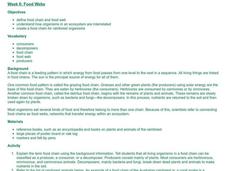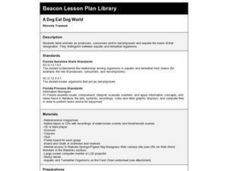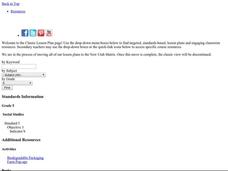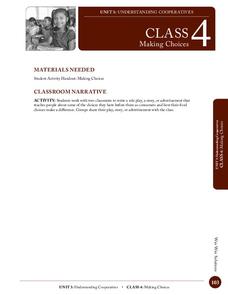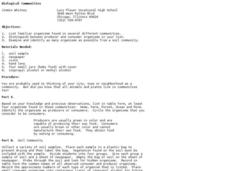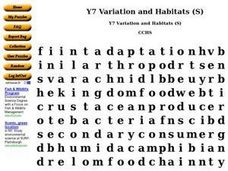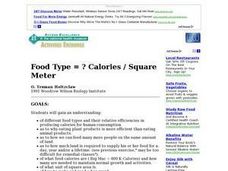Curated OER
Food Webs
Students research rainforest animals and use that information to make a flow chart to show the order in which energy is transferred through several organisms. They label the producers, consumers, and decomposers in their chart.
Curated OER
Buying a Car
Pupils complete the PLATO ¿¿ Educational Software lesson: Math Problem Solving: Car Costs to determine if he/she can afford to drive the car they are planning to buy.
Curated OER
The Big Mo
Learners develop media literacy and critical thinking skills to analyze trends and determine the extent to which their decisions may be influenced by manipulation. They examine the mathematics of trends and write about a time they...
Curated OER
Time, Talent, Treasure and Economics
Students work cooperatively to create a quilt. They choose a pattern and determine the specific skills and steps needed to produce that quilt. Labor is divided equally between group members and a quilt is created assembly line style....
Council for Economic Education
Did You Get the Message?
Students investigate how advertising gets the buyer's attention and how it influences buying decisions. They then create a print ad for "Burp Cola" and for one of their favorite books.
Curated OER
Insect Travel Brochure
Seventh graders study producers and consumers in habitats. They examine the trophic levels and how different organisms interact with a focus on insects. They create a travel brochure for an insect to visit a habitat which they create.
Curated OER
A Dog Eat Dog World
Fourth graders distinguish between acquatic and terrestrial organisms. They label animals as producers, consumers, and/or decomposers.
Curated OER
Who Is Eating Whom?
Students discuss the food chain and identify if various organisms are producers or consumers. They draw ten types of organisms and construct a food web of these organisms, labelling each as a producer or consumer.
Curated OER
Demand Shifters
Students explore concept of demand and factors that cause demand for a good or service to change; students recognize factors that influence their behavior as consumers. Real world examples are provided through an interview with William...
Curated OER
Producers and Consumers
Third graders identify the relationship between producers and consumers and supply and demand. They listen to a lecture and complete a variety of graphic organizers to show their understanding.
Curated OER
Constructing A Food Web
Students identify and explain the relationships within a food web. They use index cards to glue pictures of producers and consumers. On the back of the card, students name the organism, list the type of biome in which it is found.
Curated OER
Spam University
Young scholars read a New York Times article in order to consider the dissemination of information. They investigate the need for privacy as opposed to the need for information by looking at mass on-line and postal mail distributors.
Curated OER
Food Chains and Webs
Students identify the organisms found near their school or house and observe them. In this food chain lesson students examine how an organism gets their energy and then fill in a chart to create a food web with the organisms they...
Curated OER
Source Search
Fifth graders discover how agriculture affects our daily lives. In this agriculture lesson, 5th graders investigate different products that originate from agriculture. Resources are provided.
Curated OER
Capital for Cookies
Fourth graders examine the history of Utah's economy. In this Social Studies lesson, 4th graders analyze producers and consumers role in the community. Students study Utah's economy throughout history.
Curated OER
Strands Walk An Ecological Observation
Students examine an ecosystem and analyze the role of two abiotic factors in the ecosystem. In this ecosystem lesson students complete an activity on their ecosystem.
Curated OER
Making Choices
Young scholars work with a partner to write a play, story or ad that teaches about our choices as consumers. Students focus on educating people about how food choices make a difference in their lives.
Curated OER
Biological Communities
Students identify consumers and producers in different communities. Students collect a variety of soil samples and record organisms found in the samples.
Curated OER
What is a Food Chain?
In this food chain worksheet, students write in the 3 steps that occur in a basic food chain. This worksheet is a graphic organizer.
Curated OER
Trophic Levels and Food Webs
In this biology learning exercise, learners identify and locate various vocabulary terms related to trophic levels and food webs. There are 27 biology terms located in the word search.
Curated OER
Y7 Variation and Habitats (S)
In this biology worksheet, students identify and locate various vocabulary terms relating to variations and habitats of living things. There are 37 biology terms located in the word search.
Curated OER
Where to shop?
Students study a topic of an environmental nature that is relevant to them (as individuals) on a local level, but with global implications. They consider whether their family's shopping habits have any lasting effects on the environment.
Curated OER
Food Type And Calories Per Square Meter
Students compare the efficiency of producing food calories in different types of food then calculate how much land is required to supply their food for a year. They then graph the results.
Curated OER
Consumerism - Brand Comparison Lab
The student will have an opportunity for themselves to determine which brand they prefer by comparing national and store brands by their appearance, cost and flavor. They will be looking for the best economical value.


